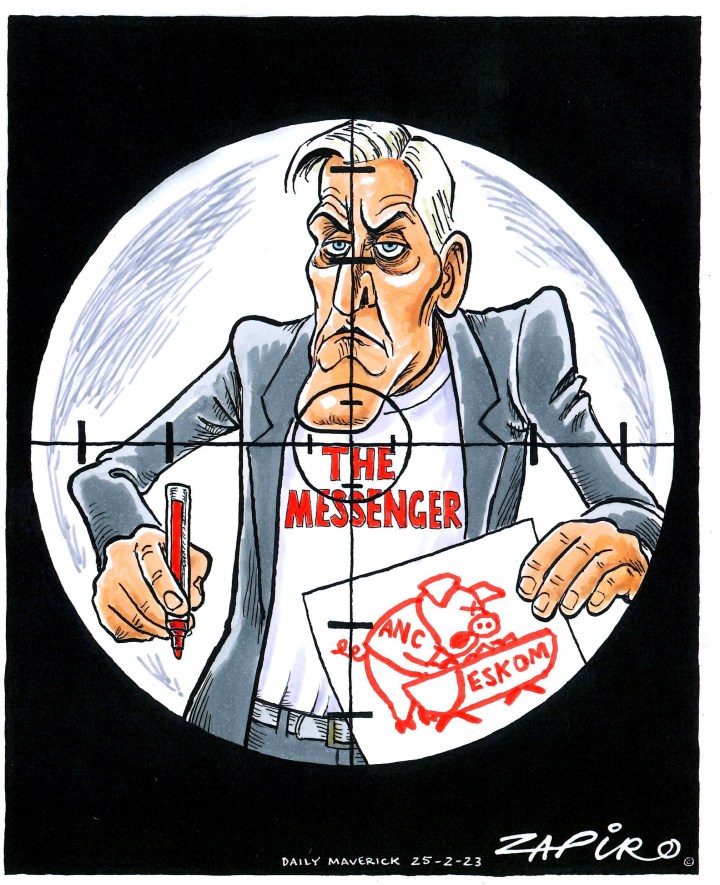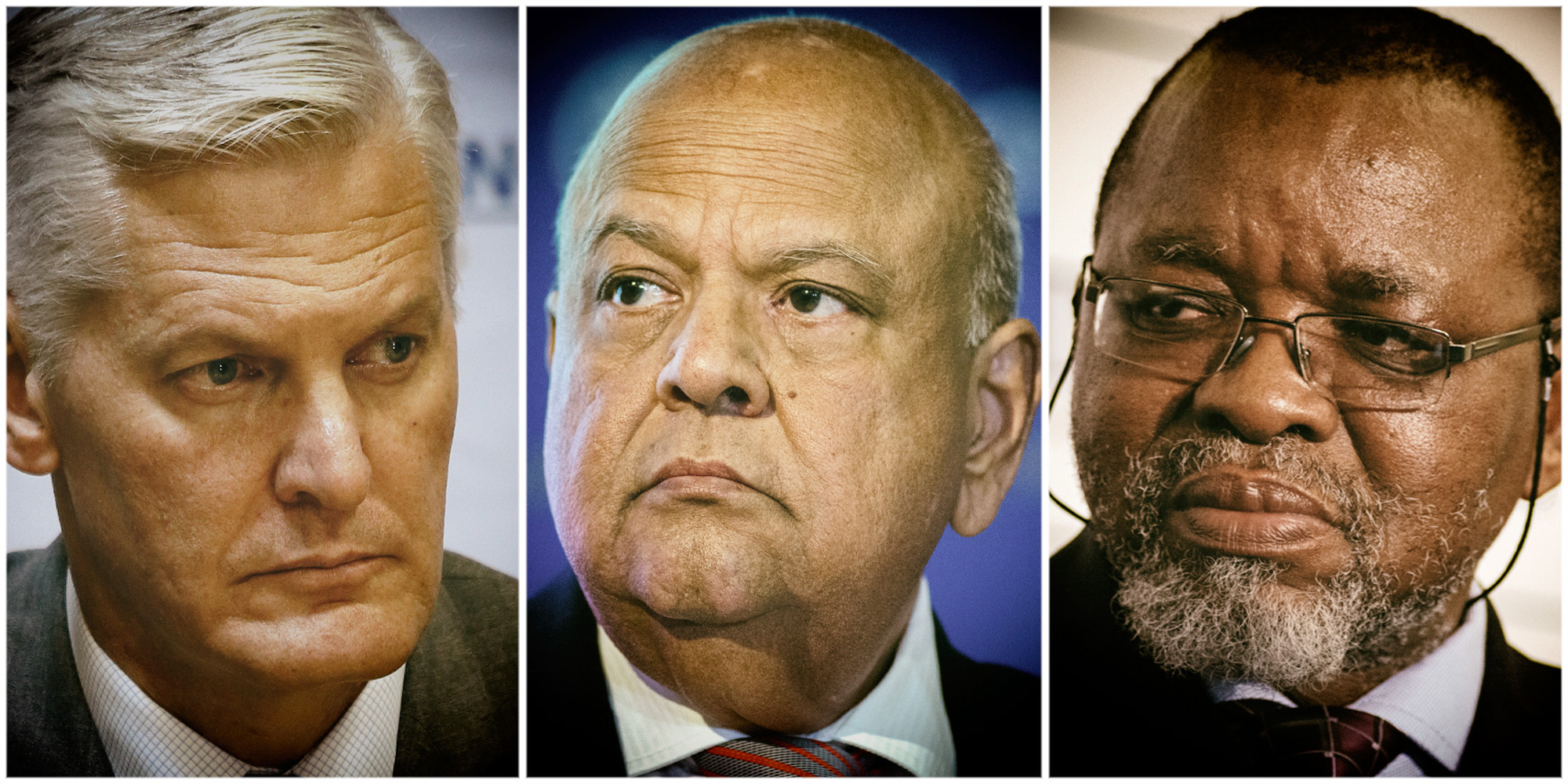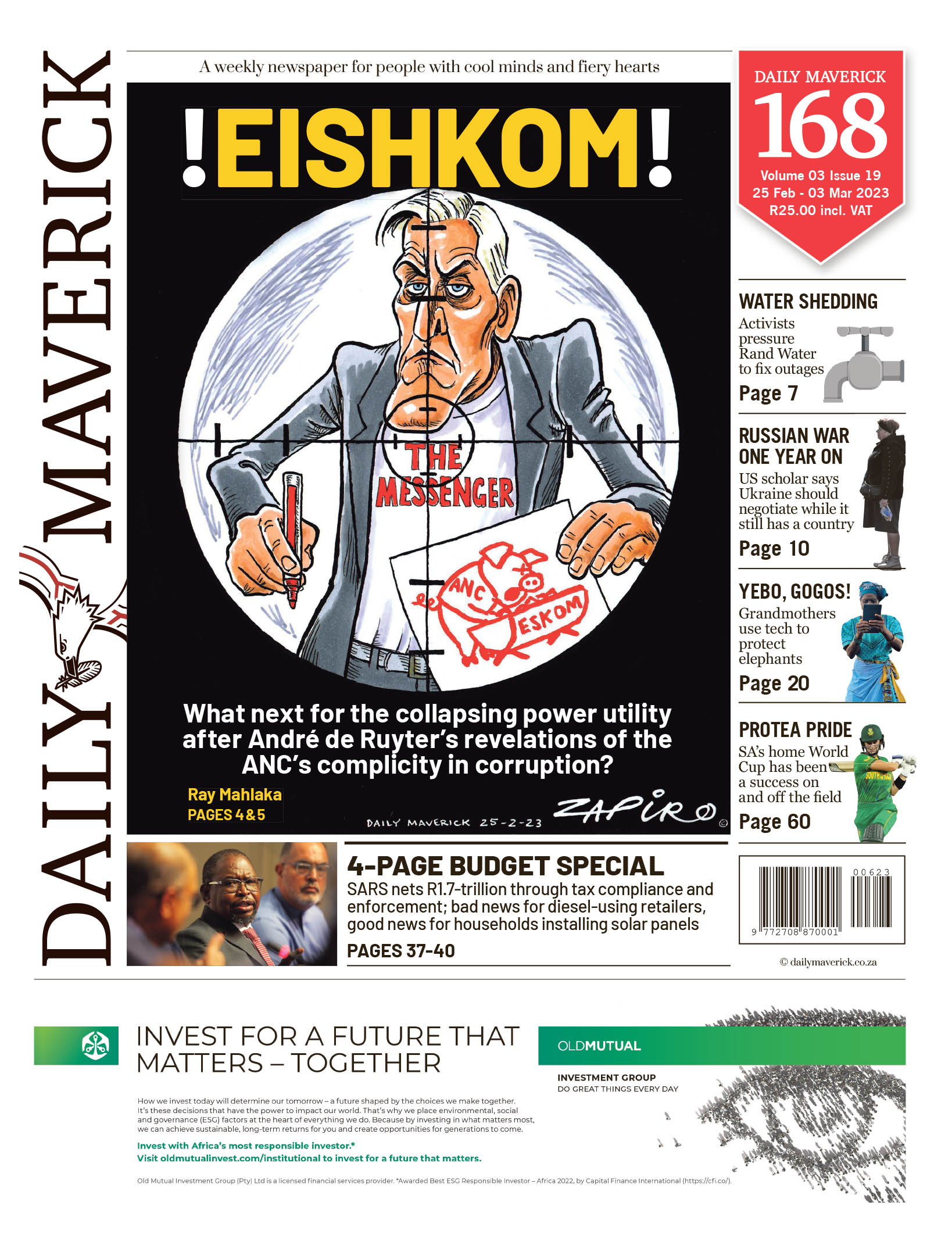SHEDDING LIGHT
De Ruyter is out, Cassim is in, but will this switch the lights on?

Over the past three years, Eskom has made progress in improving its financial situation. Losses are not widening and its debt load is improving. But it still has a big State Capture and corruption problem, and the $8.5-billion raised to fund the energy transition presents a target for more plundering.
Outgoing Eskom CEO André de Ruyter laid bare the extent of the ANC’s complicity in corruption at Eskom in an explosive interview with eNCA’s Annika Larsen, saying there was evidence to indicate that some individuals in the party saw the power utility as a “feeding trough”.
Worryingly, he said individuals in the ANC were allegedly targeting the $8.5-billion in funding that Eskom and the government raised in 2022 to fund South Africa’s transition to cleaner energy, after the COP26 climate summit in Glasgow.
The $8.5-billion package includes grants and loans from the UK, the US, France, Germany and the EU that will help South Africa to retire coal-fired power stations and repurpose them into renewable energy sources, and build electric vehicle infrastructure.
De Ruyter recounted the alleged attempt by the ANC to plunder the $8.5-billion:
“I expressed my concern to a senior government minister about attempts – in my view – to water down governance around the $8.5-billion that, by and large through Eskom intervention, we got at COP26.
“The response was essentially, ‘You know, you have to be pragmatic – in order to pursue the greater good, you have to enable some people to eat a little bit.’ So yes, I think it is entrenched,” De Ruyter said in the interview. He did not name the minister, but said they remained in government.
In essence, De Ruyter directly fingered the ANC in corruption at Eskom, and clearly ruffled feathers, and his comments prompted a striking rebuke from the power utility’s board and the political party.
The board asked De Ruyter to leave with immediate effect and not serve out the balance of his notice period, which had been set to end on 31 March.
Public Enterprises Minister Pravin Gordhan, who oversees the governance affairs of Eskom, joined a long list of ANC members who have trashed De Ruyter for his comments, saying he shouldn’t “meddle in politics”. In Parliament, Gordhan argued CEOs in the state-owned enterprise (SOE) universe should keep whatever political views they held private and not get involved in “open political debates”.
ANC secretary-general Fikile Mbalula and Finance Minister Enoch Godongwana expressed similar sentiments.
De Ruyter’s comments imply that the ANC doesn’t see the findings of the Zondo Commission into State Capture as a lesson in doing things differently when it comes to governing and the governance of SOEs.
After all, the ANC and its officials are implicated in State Capture, as a series of Zondo’s reports found that the party’s cadre deployment policy and interference at SOEs created fertile ground for corruption to thrive at Eskom.

From left: Eskom CEO André de Ruyter. (Photo: Gallo Images / Phil Magakoe) | Public Enterprises Minister Pravin Gordhan. (Photo: Waldo Swiegers / Bloomberg via Getty Images) | Minister of Mineral Resources and Energy Gwede Mantashe. (Photo: Waldo Swiegers / Bloomberg via Getty Images)
Judge Raymond Zondo put the total cost of contracts at Eskom that have been affected by State Capture at R14.7-billion. This estimate is arguably conservative and the amount could run into more billions of rands considering that the ANC allegedly benefited from contracts for the construction of Eskom’s Medupi and Kusile power stations via its investment arm, Chancellor House.
Political analyst Dr Ralph Mathekga said De Ruyter’s comments were further evidence that State Capture had not ended as some of the middle to senior managers in SOEs and high-ranking ANC officials who are implicated in corruption were still in the system and had not faced prosecutions.
“There is a moral crisis. The government has not taken a moral position to defend the Zondo Commission and take action against ministers that are implicated in corruption.
“The likes of Gwede Mantashe [the energy minister] and Zizi Kodwa [deputy state security minister] still have their jobs despite being named in the Zondo reports. They have not supported the Zondo Commission but have ridiculed it,” Mathekga told DM168.
“De Ruyter’s removal from Eskom is a shame on the government. If the state was capable, De Ruyter could be seen as a whistleblower and offered protection. His allegations need to be investigated.”
Wayne Duvenage, CEO of the Organisation Undoing Tax Abuse (Outa), shared Mathekga’s views.
“If President Cyril Ramaphosa was serious about rooting out corruption, he would sit down with De Ruyter and ask him to give him all the evidence to get to the bottom of the corruption problem. But we know that won’t happen. The president doesn’t have the balls or the moral courage to do so,” said Duvenage.
How successful was De Ruyter’s tenure at Eskom?
Although there are not many green shoots when it comes to Eskom, there have been positive developments and reforms in its financial situation over the past three years.
It is still pencilling in financial losses that are worrying, but the extent of the power utility’s money-losing streak is easing, suggesting that it was beginning to turn the corner under De Ruyter.
Eskom recorded a financial loss of R21-billion in 2020, declining to R18.9-billion in 2021 and R12.3-billion in 2022. Its debt has also been on a downward trajectory over this period, dropping by R61-billion to R423-billion. This is no small feat for a company that is fighting crippling problems on many fronts.
Eskom’s smothering debt load of R423-billion should decline further after the announcement in the Budget earlier this week that the government planned to take over as much as R254-billion of it.
This is a step forward in reducing the debt because any money that Eskom generates from the sale of electricity will go towards the critical maintenance of its power stations – the breakdowns of which cause rolling blackouts – instead of servicing debt payments.
Debt and interest payments alone consume about 40% of Eskom’s revenue and will decline after the government’s latest intervention.
But all of this positive momentum is overshadowed, and arguably wiped out, by the governance and corruption crisis that continues to grip the power utility.
State Capture elements still present
De Ruyter’s interview on eNCA reminded South Africa that corruption is still entrenched at the power utility and that State Capture forces are still prevalent. In some respects, Eskom is losing the battle to stem the tide of corruption that has persisted for decades.
Protecting climate change billions
For now, the priority should be to safeguard the $8.5-billion climate change funding against theft. The grants and loans are set to go directly into the public purse, and the National Treasury tends to be reluctant to ring-fence funds. But it will have to ensure this money goes to the just energy transition plan.
Cas Coovadia, the CEO of Business Unity South Africa, the country’s largest business organisation, has proposed that all major procurement contracts related to the climate change programme must be “transparent to assure the public that proper processes and structures are in place to prevent any corruption and to hold those responsible to account”.
The Treasury is already taking steps to ensure that there are tight safeguards in its plan to take over almost two-thirds of Eskom’s debt.
How it will work is that the Treasury will offer Eskom subordinated loans worth R254-billion – funds that will be released in three tranches over the next three years. During this period, there will be strict conditions attached to the funding.
Eskom can use the funding only to pay down its debt (it cannot even use the funds to buy diesel for its emergency generation fleet); it cannot borrow more money from commercial banks; and it can invest only in its transmission and distribution network (over time Eskom could exit power generation altogether). If Eskom breaches these conditions, it would be forced to pay back the money immediately.
Peter Attard Montalto, Intellidex’s head of capital markets, sees the strict conditions as positive, saying he believes the Treasury acted unilaterally given the “recalcitrant” Energy and Public Enterprises departments, which have both mismanaged the energy crisis. Mantashe is legally responsible for the procurement of additional energy (even renewable), but not a single megawatt of new generation capacity has been connected to the grid since 2018.
Gordhan delayed the appointment of a full and experienced Eskom board, the power utility’s governing body.
The Energy Department wants Eskom to undertake new coal and gas energy projects but the Treasury’s conditions on the funding will bar the power utility from doing so. There will now be full transparency if either Eskom or the Energy Department pushes new energy projects, says Attard Montalto.
The Eskom board has announced that Calib Cassim, the Eskom chief financial officer (CFO), will be the interim CEO after De Ruyter’s immediate departure this week. Cassim, a chartered accountant who holds a master’s degree in business leadership, has been the parastatal’s CFO since November 2018, after serving as acting CFO from July 2017.
The search for a new CEO is under way, a process that Outa’s Duvenage said would be difficult. “I pity the person who takes over as Eskom’s CEO. The new CEO should be able to tell the government to back off and stop meddling in Eskom operations.”
In some instances, De Ruyter dared to push back against political interference, making enemies in the process. But 2022 was the worst year on record for load shedding and his performance at Eskom will probably be measured and judged through this lens. DM168
This story first appeared in our weekly DM168 newspaper which is available for R25 at Pick n Pay, SPAR and Exclusive Books. For your nearest stockist, please click here.




















Pravin Gordhan: ‘he shouldn’t “meddle in politics”‘
Pravin I would like to put it to you that politicians shouldn’t meddle in Eskom.
oink oink
“Mantashe is legally responsible for the procurement of additional energy (even renewable), but not a single megawatt of new generation capacity has been connected to the grid since 2018.” He has no intention in favour of our environment, on the contrary. We should mobilize as we did against Zuma! Mantashe must go ASAP!
One of De Ruyter’s greatest contributions was to, right from the start of his tenure, open Eskom to the media and the public. Now we all know what the state of Eskom is, where the problems are. Thank you AdR.
The ANC is the fox and Eskom the henhouse. The Zondo Report has clearly not interrupted the looting at all.
To stop the meddling in Eskom by politicians, there is only one way: It should be privatised. As long as the government is the shareholder, the meddling will continue, probably even when the ANC is voted out. How about creating an independent public shareholder that is ONLY accountable to the public by means of independent elections? I wonder if that will not work better.
. . . And of course the ANC will want to silence De Ruyter! It is because he is exposing them and they know that what he said is true; so they want to discredit him so the stealing can go on. But fortunately Gordhan has apparently indicated that the allegations will be investigated.